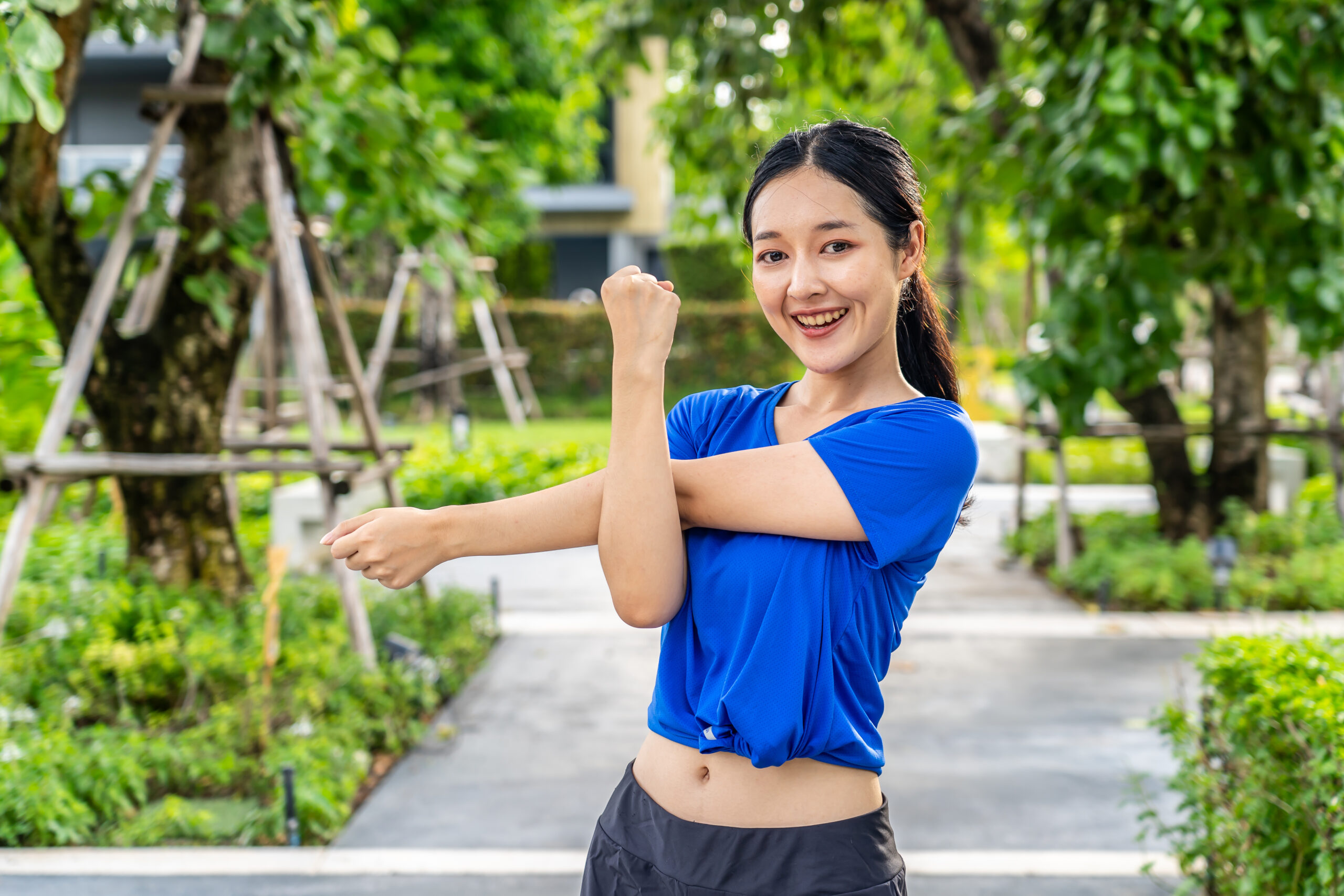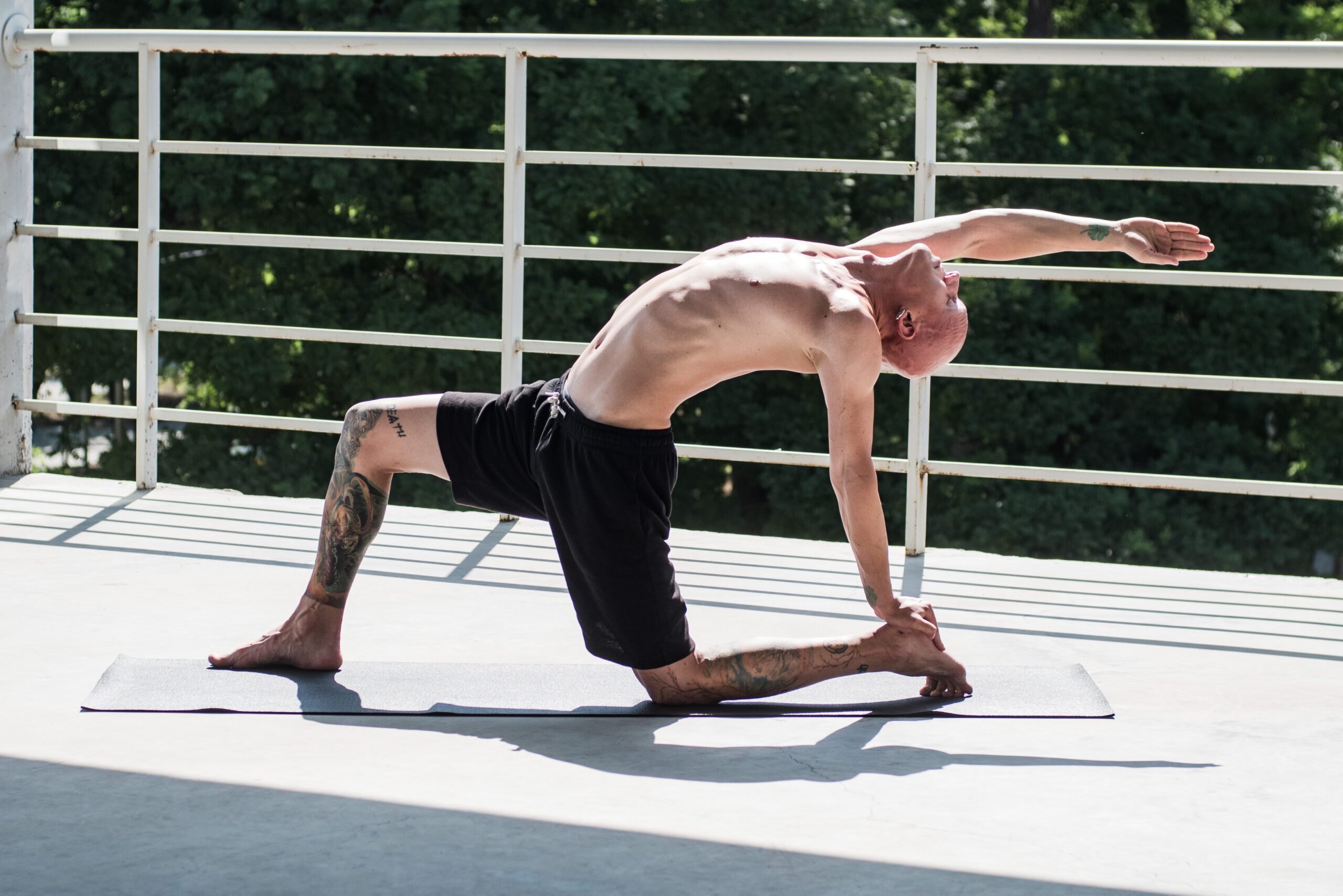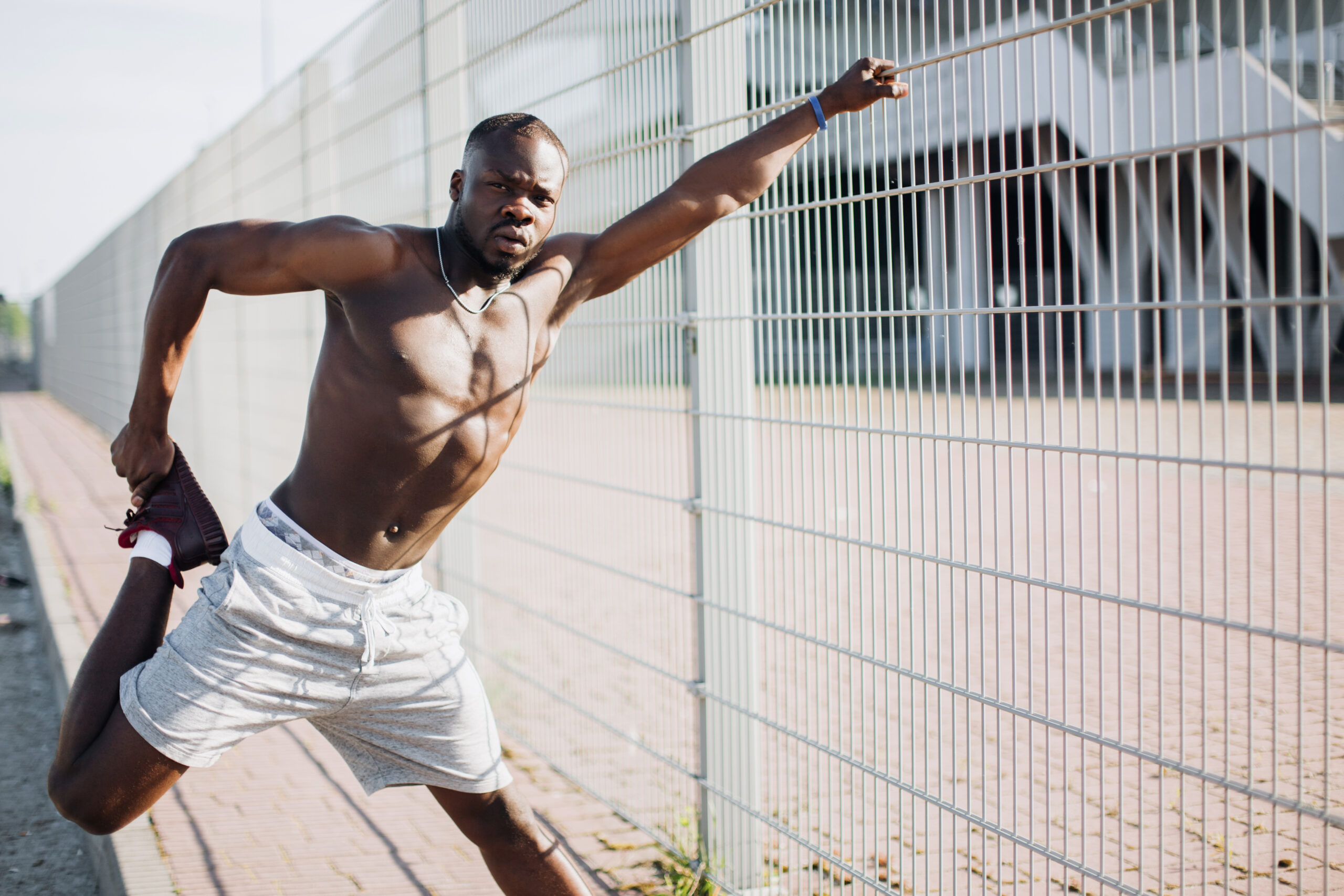Master Your Body: Calisthenics Exercises & Progressions for Every Level
FOR STRENGTH
FOR MOBILITY AND FLEXIBILITY
Before beginning to demand from your muscles and joints, it’s best to prepare it by warming up. This will allow you to perform better right from the start, and avoid injury.
Click here for a great 15MIN easy stretching routine you can do before starting your workouts!
How to know when you’re ready for the next progression:
Knowing when to progress in calisthenics is crucial to make gains safely and avoid injury. When you exceed the rep range of 3 sets of 12 to 15 reps in a controlled tempo, with the full range of motion, and great form you are ready for the next progression.
CALISTHENICS FOR STRENGTH
Push up
What Muscles Does a Push Up Target?
Push ups mainly target chest. But it also works shoulders (for stability), triceps, core, back and glutes.
How To Do a Proper Push Up?
- Start with the plank position
- Place your hands directly under your shoulders
- Engage your core an squeeze your glutes
- Maintain a straight line from your head to your heels
- Lower your body
- Keep your elbows at a 45 degree angle
- Avoid letting your hips sag or elbows flare out
- Aim to bring your chest down toward the floor
- Push back up
Push Up Progression (Beginner To Advanced)
- Knee Push ups
- Standard Push ups
- Archer Push ups
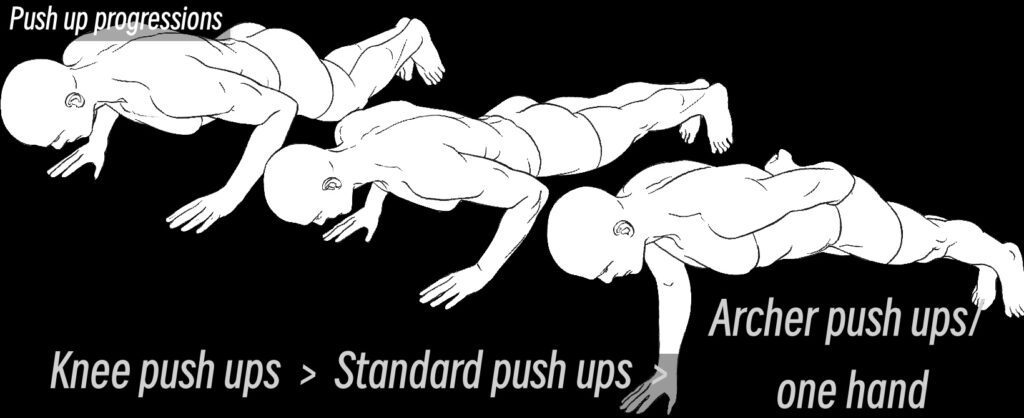
Pull Up
What Muscles Does a Pull Up Target?
Pull ups target lats, biceps, forearms, shoulders, and core. They are great to build a strong & defined back.
How To Do a Proper Pull Up
- Grip the bar.
- Engage your body
- Pull your shoulders down and back. Avoid shrugging.
- Tighten your core and position your legs straight crossed behind you.
- Pull Up
- Drive your elbows down and back to lift yourself. Aim to bring your chin over the bar without craning your neck.
- Lower slowly
Pull Up Progression (Beginner to Advanced)
- Assisted Pull Up/ Band Pull Up
- Full Pull Ups
- Muscle Ups
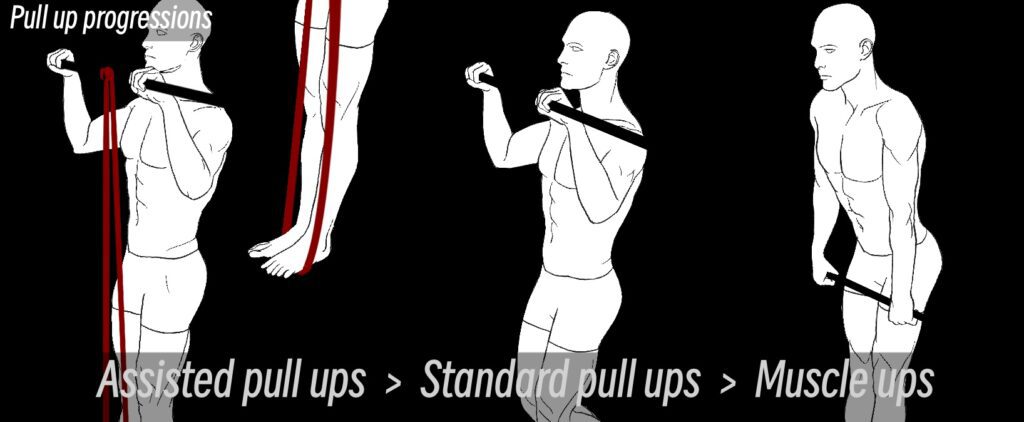
Dips
What Muscles Do Dips Target?
Dips target primary the triceps, but it also can engage chest, the front part of your shoulders, core, and upper back. Maintain good posture throughout the movement by keeping your chest lifted and your shoulders slightly back.
How To Do Dips Properly
- Begin by sitting at the edge of a sturdy table. Place your hands shoulder-width apart with your fingers pointing forward.
- Carefully slide your hips off the edge, supporting your weight with your hands.
- You can either bend your legs 90 degrees for an easier variation, or extend them straight to increase the challenge.
- Gently bend you elbows to lower your body straight down.
- Make sure to keep your elbows tucked in, pointing straight back rather than flaring out to the sides.
- Lower yourself until you make a 90 degree angle with your arms. (Or a bit more if you can)
- Return to starting position. Straighten your arms.
Dips Progression (Beginner to Advanced)
- Bench Dips
- Parallel Bar Dips
- Korean Dips / Ring Dips
Chin Ups
What Muscles Do Chin Ups Target?
Chin ups are great for building back and arm muscles. They target your biceps, lats, rhomboids, traps, forearms and core. If you’re a beginner, chin ups might be easier compared to pull ups since the biceps do a lot of the work. Chin ups are a fantastic stepping stone towards achieving your first pull up.
How To Do a Proper Chin Up
- Grip the bar
- Hang and set your shoulders
- Start from a dead hang position
- Pull your shoulder blades down and back to engage your upper back
- Activate your core
- Pull up
- Drive your elbows down and back as you pull yourself up
- Make sure your chin gets over the bar
- Avoid using momentum
- Lower with control
Chin Up Progressions (Beginner to Advanced)
- Band Assisted Chin Ups
- Strict Chin Ups
- Weighted Chin Ups
Equip your journey for awesome results. Read about the weighted vest here.
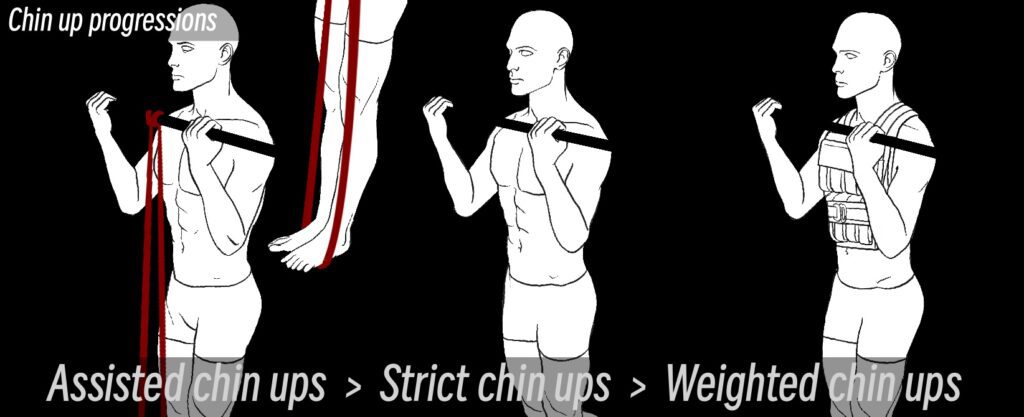
Pistol Squat
What Muscles Do Pistol Squats Target?
Pistol squats work quads, glutes, hamstrings, hip flexors, and calves. They help you build power especially in your quads and glutes. Because it improves balance and stability its a great exercise for injury prevention.
How To Do A Proper Pistol Squat
- Start standing tall
- Shift your weight
- Transfer your weight to one leg and lift the other leg straight out in front of you.
- Lower slowly
- Keep that lifted leg extended and close to the ground. Push your hips back while bending the knee of your standing leg. Take your time lowering down until your hamstring is nearly touching your calf.
- Pause at the bottom
- Find your balance point and maintain tension. Avoid collapsing and make sure your heel stays grounded.
- Drive back up
Pistol Squat Progressions
- Assisted Pistol Squat (hold something)
- Bodyweight Pistol Squat
- Weighted Pistol Squat
Grow powerful & aesthetic legs with the right gear. Read about the weighted vest here.
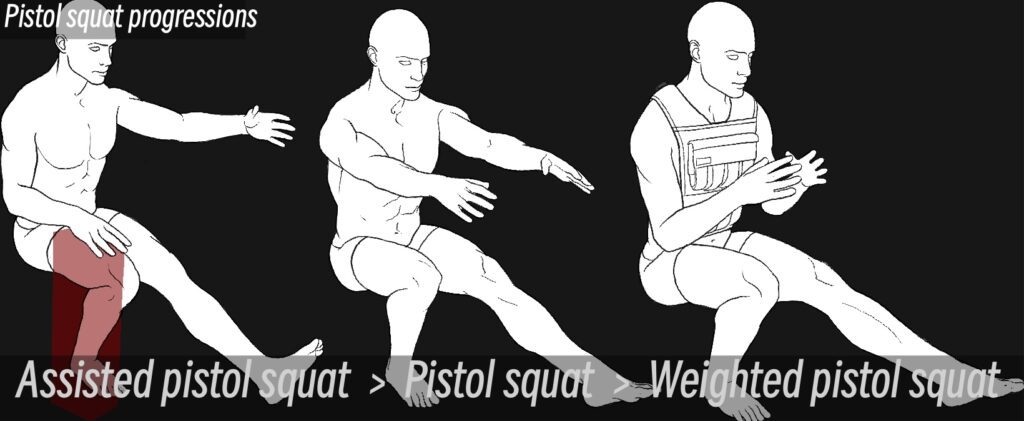
CALISTHENICS FOR MOBILITY AND FLEXIBILITY
Reverse Plank
What Muscles Does Reverse Plank Target?
The reverse plank, also known as the supine plank works glutes, hamstrings, lower back, shoulders, core, chest and biceps. This exercise can help with posture–counteracting the slouched shoulders and rounded back that come from long hours at the desk.
How To Do A Proper Reverse Plank
- Start seated
- Lift your hips
- Engage your glutes and core, lifting your hips to create a straight line from your heels to your shoulders.
- Hold the position
- Keep your chest open and hips elevated.
- Don’t let your shoulders droop or your hips sag.
- Breathe and maintain
Reverse Plank Progressions
- Tabletop Bridge Hold
- Reverse Plank (straight legs)
- Reverse Plank with Leg Lifts
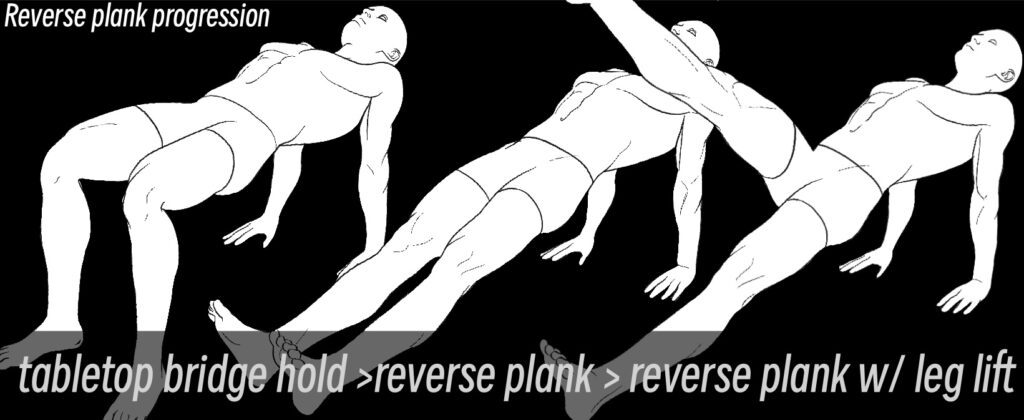
Wrist Push Up
What Muscles Does A Wrist Push Up Target?
Wrist push ups work forearms, wrists, triceps, chest, shoulders and core. They are not only great for muscles, but for joint conditioning as well. Wrist push ups are an advanced skill challenge, but there are a lot of progressions you can start with. Remember to build up strength gradually before trying this.
How To Do A Proper Wrist Push Up
- Warm up first
- Get into position
- Begin either kneeling or in a full plank position
- Position the backs of your hands on the ground with your fingers pointing forward.
- Keep your elbows straight but not locked, and shoulders above your wrists.
- Lower your body
- Engage your core and aim to keep your body in a straight line.
- Bend your elbows and lower your chest toward the floor.
- Keep the movement slow and controlled
- Push back up
Wrist Push Up Progressions
- Fist Push Ups
- Partial Wrist Pushups
- Full Wrist Pushups
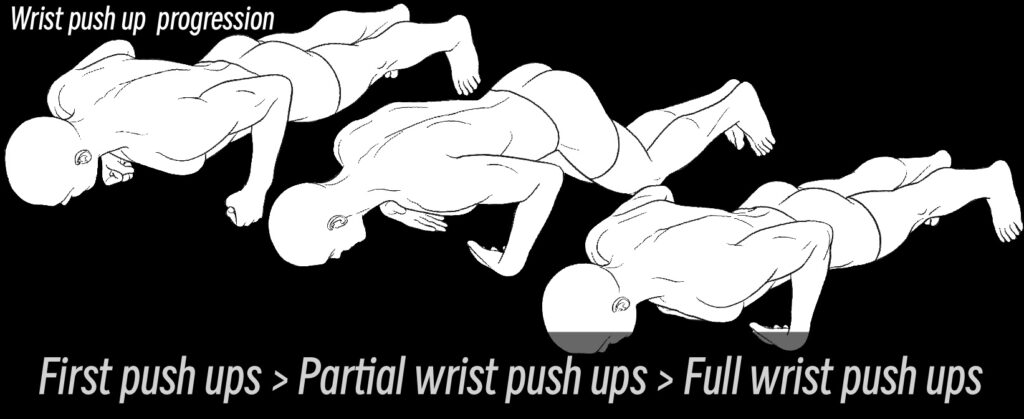
Single Leg Box Squat
What Muscles Do Single Leg Box Squats Target?
Single leg box squats mostly target quads, but also work on glutes, hamstrings, calves, ankles, core and hip stabilizers. Weather you’re starting out or advanced, you can adjust the height of the box to make it fit your current skill level and progress.
How To Do A Proper Single Leg Box Squat
- Set up
- Brace your core & shift back
- Keep your chest lifted and shoulders back
- Extend your arm forward to help with balance
- Begin to shift your hips back, as if you’re trying to sit in a chair.
- Lower with control
- Bend your standing leg and lower your body
- Keep the non-working leg lifted in front of you
- Lightly touch the box. Don’t crash down onto it!
- Stand back up
Single Leg Box Squat Progressions
- Higher box
- Lower box
- Full Pistol Squat (no box)
Bridge / Backbend
What Muscles Does The Bridge / Backbend Target?
The bridge / backbend is a great movement that enhances spinal flexibility, hip mobility, and overall boy control. There are two variations of this exercise. The glute bridge and the full bridge/ backbend. On the glute bridge you keep your shoulders and feet touching the ground. While doing the full bridge / backbend your hands and feet go on the ground.
The glute bridge mainly targets glutes, hamstrings, lower back and core.
While a full bridge / backbend engages your spinal erectors (the entire back), glutes, hamstrings, shoulders, arms, hip flexors, quads, core and obliques. It’s a full body workout!
How To Do A Proper Bridge / Backbend
- Start lying down
- Engage and lift
- Press down through your feet and hands, lifting your hips, chest and shoulders off the ground to form an arch. Keep your elbows strong and legs engaged.
- Hold and breathe
- Take deep, calming breaths, letting your head hang relaxed. Hold this position for 10-30 seconds before gently lowering back down.
- Come down slowly
To finish it can be nice to follow up with a gentle forward fold or pull your knees to your chest for a soothing stretch.
Bridge / Backbend Progressions
- Glute Bridge
- Wall Bridge / Assisted Bridge
- Full Backbend Pushup
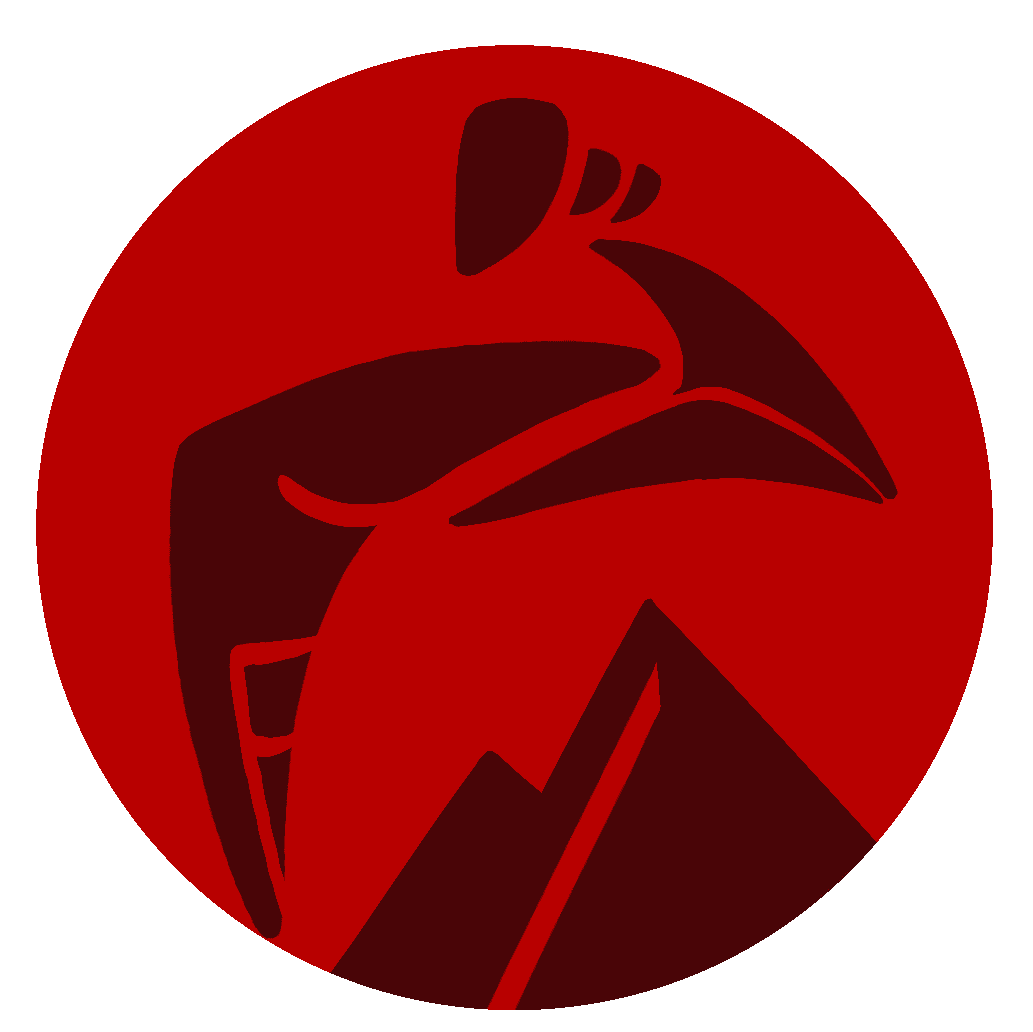
Easy 15MIN Full-Body Stretching Routine
Here’s a friendly full-body flexibility and mobility routine that you can easily stretch daily , or a few times a week. This routine will only take…
Stretching vs. Not Stretching: Never Overlook Stretching Again
Whether you’re 25 or 65, stretching just a few minutes a day can greatly improve how you move, feel, and age. Most people view stretching as…
The 8 Types of Stretching Routines—And Know When to Use Each One
Stretching is often overlooked as just a simple warm-up or cool-down, but it actually plays a key role in enhancing our physical and mental health. It…
